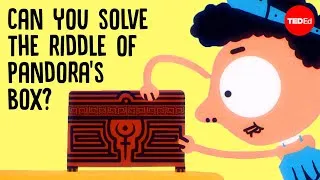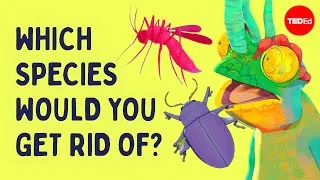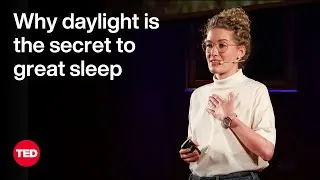Camera or eye: Which sees better? - Michael Mauser
眼睛 vs. 相機 - Michael Mauser
1,623,557 views ・ 2015-04-06
請雙擊下方英文字幕播放視頻。
譯者: Huan-Yu Hsieh
審譯者: Marssi Draw
00:11
Watch the center of this disk.
0
11617
3632
請看轉盤的中心。
00:15
You are getting sleepy.
1
15249
2827
你開始覺得睏。
00:18
No, just kidding.
2
18076
1608
開玩笑的,
00:19
I'm not going to hypnotize you.
3
19684
1834
我沒有要催眠你。
00:21
But are you starting
to see colors in the rings?
4
21518
4041
不過你開始看到圓圈的色彩了嗎?
00:25
If so, your eyes
are playing tricks on you.
5
25559
3347
如果看得到,
表示你的眼睛正在捉弄你。
00:28
The disk was only ever black and white.
6
28906
3115
轉盤從頭到尾都是黑白的。
00:32
You see, your eyes don't always
capture the world as a video camera would.
7
32021
4722
你看,你的眼睛並不總是
像攝影機一樣捕捉世界。
00:36
In fact, there are quite
a few differences,
8
36743
2792
事實上,兩者有許多不同,
00:39
owing to the anatomy of your eye
9
39535
2152
歸因於眼睛的構造,
00:41
and the processing
that takes place in your brain
10
41687
2418
以及大腦裡的處理過程,
00:44
and its outgrowth, the retina.
11
44105
4529
和它的發展結果──視網膜。
00:48
Let's start with some similarities.
12
48634
2113
我們先來看一些相似之處。
00:50
Both have lenses to focus light
and sensors to capture it,
13
50747
3951
兩者都有鏡頭可以對光線聚焦,
還有感光元件捕捉光線,
00:54
but even those things behave differently.
14
54698
2416
但作用方式很不一樣。
00:57
The lens in a camera moves to stay
focused on an object hurtling towards it,
15
57114
4824
相機鏡頭以移動
對投擲過來的物體對焦,
01:01
while the one in your eye responds
by changing shape.
16
61938
4942
而眼睛的反應方式則是改變形狀。
01:06
Most camera lenses are also achromatic,
17
66880
2992
大部分相機鏡頭是「消色差」的,
01:09
meaning they focus both red
and blue light to the same point.
18
69872
4274
意即相機會將紅光與藍光
聚焦在同一個點上。
01:14
Your eye is different.
19
74146
1795
你的眼睛則不同。
01:15
When red light from an object is in focus,
the blue light is out of focus.
20
75941
4953
當一個物體的紅光是對焦的,
藍光就失焦了。
01:20
So why don't things look
partially out of focus all the time?
21
80894
3564
那為什麼我們看東西
不會一直覺得有部分失焦?
01:24
To answer that question,
22
84458
1632
要回答這個問題,
01:26
we first need to look at how your eye
and the camera capture light:
23
86090
4339
我們首先要來看
眼睛和相機如何捕捉光線:
01:30
photoreceptors.
24
90429
2866
光感受器。
01:33
The light-sensitive surface in a camera
only has one kind of photoreceptor
25
93295
5357
相機中的感光表面只有一種光感受器,
01:38
that is evenly distributed
throughout the focusing surface.
26
98652
3859
平均分布在整個對焦表面。
01:42
An array of red, green and blue filters
on top of these photoreceptors
27
102511
4822
這些光感受器上有
一個陣列的紅、綠、藍濾鏡,
01:47
causes them to respond selectively to
long, medium and short wavelength light.
28
107333
7707
讓它們分別對
長、中、短波光線產生反應。
01:55
Your eye's retinas, on the other hand,
have several types of photoreceptors,
29
115040
4463
眼睛的視網膜則有
幾種不同的光感受器,
01:59
usually three for normal light conditions,
and only one type for lowlight,
30
119503
4752
通常正常光線狀況下有三種,
低光源下只有一種,
02:04
which is why we're color blind
in the dark.
31
124255
2703
這也是為什麼我們
在黑暗中會產生色盲。
02:06
In normal light, unlike the camera,
we have no need for a color filter
32
126958
4695
在正常光線下,
我們不像相機需要色彩濾鏡,
02:11
because our photoreceptors
already respond selectively
33
131653
3822
因為我們的光感受器
已經會對不同波長
02:15
to different wavelengths of light.
34
135475
3633
分別產生反應。
02:19
Also in contrast to a camera,
35
139108
1988
另外和相機不同之處在於
02:21
your photoreceptors
are unevenly distributed,
36
141096
2960
你的光感受器並不平均分布,
02:24
with no receptors for dim light
in the very center.
37
144056
3630
在最中間的地方,
沒有對昏暗光線的接收器。
02:27
This is why faint stars seem to disappear
when you look directly at them.
38
147686
5367
這就是為什麼當我們直視
微弱的星光時,星星會消失不見。
02:33
The center also has very few receptors
that can detect blue light,
39
153053
4497
中間位置也只有
極少數接收器可以偵測藍光,
02:37
which is why you don't notice the blurred
blue image from earlier.
40
157550
4142
所以你之前就沒有注意到
模糊的藍色影像。
02:41
However, you still perceive blue there
41
161692
2859
不過你仍然可以察覺到那裡有藍色,
02:44
because your brain
fills it in from context.
42
164551
4020
因為你的大腦會依據
周圍狀況將其補充進去。
02:48
Also, the edges of our retinas
have relatively few receptors
43
168571
3949
而且視網膜邊緣
任何波長光線的接收器
02:52
for any wavelength light.
44
172520
2212
都比較少。
02:54
So our visual acuity
and ability to see color
45
174732
2766
所以我們的視覺敏銳度
和察覺色彩的能力,
02:57
falls off rapidly
from the center of our vision.
46
177498
4789
會從我們視線中心
急速往兩邊下降。
03:02
There is also an area in our eyes
called the blind spot
47
182287
3659
眼睛裡也有個區域叫盲點,
03:05
where there are no
photoreceptors of any kind.
48
185946
3272
那裡沒有任何種類的光感受器。
03:09
We don't notice a lack of vision there
49
189218
1902
我們不會察覺那裡看不到,
03:11
because once again,
our brain fills in the gaps.
50
191120
3496
因為大腦再次幫我們填補了空隙。
03:14
In a very real sense,
we see with our brains, not our eyes.
51
194616
5337
事實上,我們是用大腦來看事物,
而不是眼睛。
03:19
And because our brains,
including the retinas,
52
199953
2314
而且因為我們的大腦,包括視網膜,
03:22
are so involved in the process,
53
202267
2212
在這個過程中涉入極深,
03:24
we are susceptible to visual illusions.
54
204479
3952
我們很容易產生視覺上的錯覺。
03:28
Here's another illusion
caused by the eye itself.
55
208431
3341
這裡有另外一個錯覺的例子,
是眼睛本身造成的。
03:31
Does the center of this image
look like it's jittering around?
56
211772
3380
這個畫面的中心看起來一直跳動嗎?
03:35
That's because your eye actually
jiggles most of the time.
57
215152
3496
這是因為實際上
你的眼球一直在移動。
03:38
If it didn't, your vision
would eventually shut down
58
218648
3120
如果不移動,
你的視覺最終將會停止,
03:41
because the nerves on the retina
stop responding to a stationary image
59
221768
4467
因為視網膜上的神經
對強度不變的靜止畫面
03:46
of constant intensity.
60
226235
3783
停止產生反應。
03:50
And unlike a camera,
61
230018
1549
和相機不同,
03:51
you briefly stop seeing whenever you make
a larger movement with your eyes.
62
231567
4595
當你的眼睛大幅移動時,
視力會短暫停止。
03:56
That's why you can't see
your own eyes shift
63
236162
2348
這就是為什麼你在鏡子中,
03:58
as you look from
one to the other in a mirror.
64
238510
4296
看不到自己的眼睛
從一處移動到另一處。
04:02
Video cameras can
capture details our eyes miss,
65
242806
3662
攝影機可以捕捉
我們眼睛錯過的細節,
04:06
magnify distant objects
66
246468
2179
放大遠處的物體
04:08
and accurately record what they see.
67
248647
2670
並正確記錄看到的東西。
04:11
But our eyes are remarkably
efficient adaptations,
68
251317
3599
但是我們的眼睛是幾億年來
04:14
the result of hundreds
of millions of years
69
254916
2158
與大腦共演化之後
04:17
of coevolution with our brains.
70
257074
4727
高效進化的產物。
04:21
And so what if we don't always see
the world exactly as it is.
71
261801
4167
就算我們不會每次都看到
世界確切的樣子又如何。
04:25
There's a certain joy to be found
watching stationary leaves
72
265968
3669
你可以找到某些樂趣,
看著靜止的樹葉
04:29
waving on an illusive breeze,
73
269637
3476
在錯覺中隨風搖曳。
04:33
and maybe even an evolutionary advantage.
74
273113
5036
甚至觀察到演化的優勢。
04:38
But that's a lesson for another day.
75
278149
3045
這堂課改天再說吧。
New videos
關於本網站
本網站將向您介紹對學習英語有用的 YouTube 視頻。 您將看到來自世界各地的一流教師教授的英語課程。 雙擊每個視頻頁面上顯示的英文字幕,從那裡播放視頻。 字幕與視頻播放同步滾動。 如果您有任何意見或要求,請使用此聯繫表與我們聯繫。







